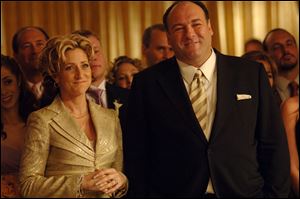
Why is TV still disrespected?
3/9/2012
Shows such as ''The Sopranos,' starring Edie Falco and James Gandolfini, have raised the bar for TV entertainment.
NEW YORK -- It's not my place to defend TV-watching.
Being a TV critic, I call attention to particular shows, good and bad. I assume the people I'm addressing have no problem with the notion of watching TV.
But what about TV's teetotalers?
How many times have I heard their lofty pronouncements: "I don't watch TV" or, even more blunt, "I don't own a TV."
They say it with a sly mix of apology and boastfulness. Their frequent explanation: TV is filled with reality shows, and who wants to see that? Or maybe no excuse is offered, as if TV's stigma as a waste of time were too self-evident to mention.
It seems to me that kind of logic is like refusing to eat anything because you might get fat. And yet: If you publicly reject TV, you rise in many people's estimation, even triggering guilt among many TV devotees (in the same way an outspoken vegan can inspire guilt among frequenters of Burger King).
It's a response unique among the many forms of arts and entertainment. Has anyone ever burnished his image by boasting of never going to the movies? Or never seeing plays or attending concerts?
But condemn TV as inherently stupid -- and in many people's eyes you look smart.
It was ever thus. TV has been getting a bad rap since its earliest days.
Just consider its earliest nicknames: boob tube; idiot box.
Consider the words of pioneering TV wiseguy Ernie Kovacs: "Television is a medium because it is neither rare nor well done."
Consider the timeless words of bygone FCC Chairman Newton Minow: "I invite you to sit down in front of your television set when your station goes on the air and stay there ... until the station signs off. I can assure you that you will observe a vast wasteland."
"Vast wasteland" was coined in a speech by Minow a half-century ago, when there were just three commercial networks, no cable-network options, few shows in color, and fuzzy, snowy pictures (with high-def transmission barely dreamed of). And yet "vast wasteland" is a term still wielded against TV today, as if nothing had changed.
In short, the snob appeal of dissing TV is as attractive today as it was when Milton Berle was cavorting in drag as Mr. Television.
But do TV defectors need to be reminded that TV's wasteland, immeasurably more vast today as it sprawls across hundreds of channels -- far more than the handful of channels in the past -- is relieved by broad swaths of solid entertainment, and by patches of inarguable brilliance?
I've given up trying to remind one friend of that. She makes a point of seeing every feature film when it opens in theaters, but disdains TV as a septic tank of reality shows and nothing else. She has never seen programs such as The Sopranos and Modern Family, Breaking Bad and Downton Abbey. And no, she doesn't own a TV.
Even the people who perform on TV seem likely to voice a dismissive attitude toward their own medium.
A few years ago I wrote about my experience interviewing TV stars and realizing that, out of hundreds I had spoken to, fewer than a dozen copped to being gung-ho fans of TV. The rest of them (if the subject came up) would tell me they were too busy to watch. They don't shun just the programs they appear in. They don't watch TV, period. Watching TV is what their public does, not they, who have better things to do. Or so they claim, almost visibly holding their nose as they say it.
The stigma of "television" becomes all the more nonsensical as the nature of TV (what does "TV" even mean?) is increasingly in flux.
Is watching a TV show on an iPad more socially acceptable than watching it on TV? (Maybe so: I've heard people who boast of not owning a TV readily admit to watching shows online, as if that somehow redeemed them.)
And, as time goes on, more and more shows all too similar to "TV shows" are originating not on TV but on Web sites. Will people need to skip those too in order to maintain their no-TV cred?
Meanwhile, social media are offering an enhanced way to "watch" television. The so-called second screen (of a computer, tablet, or smart phone) offers companion sites for a communal experience to viewing any given TV show, and for offering feedback to that show. Increasingly, TV is a two-way street, though it remains to be seen whether this active-response system to what you watch will de-stigmatize TV viewing as shamefully passive.
But what's wrong with passive viewing anyway? People who see lots of shows on TV are slammed as couch potatoes, while people who see lots of films at their local movie house earn the honorific of cineaste.
Don't get me wrong. I don't recommend watching TV as a default mode. I don't advocate binge viewing, any more than a wine critic encourages binge drinking.
But I'd like to see a new attitude about consuming TV. In 1958, the great TV newsman Edward R. Murrow said that, if TV didn't rise to its pro-social potential, it would be "merely wires and lights in a box."
More than 50 years later, Murrow would surely cringe at Jersey Shore and Hillbilly Handfishin'." But there aren't many wires in a modern flat-screen, nor, strictly speaking, are there lights, and its components aren't contained in what you'd call a box.
So maybe it's time to consider what TV is. And to rethink who we are as its viewers -- and what that makes those of us who refuse to watch.